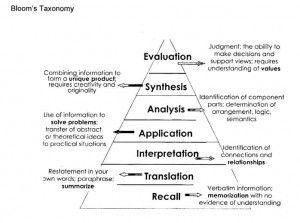Figuring out how to study involves learning how to ask a good question. It’s not about second guessing the prof or trying to determining what he or she wants. Well, not really. What we -that is your profs- want is that you learn the material we present.
But there is soooooo much to read and learn. Indeed, there is. But there are some ways to figure it out.
First read the assigned readings.
Next, compare what is discussed in class with the reading assignments. Look for key words (I call them key words because they unlock knowledge and make learning a bit easier). Are there things (ideas, words, concepts, names . . .) that your prof repeats more than once. If so, take note of it. If there are strong obvious overlaps between what is said in class and your readings -take note of it.
Now go back to your readings and ask yourself what does the author want me to learn? What is the author’s point. Don’t be tricked by the desire to critique. That’s not the point of learning -at least, not initially. A good critique involves understanding the author’s point. You should be able to rephrase the author’s points in your own words.
Finally you should recast the readings and lecture notes into questions. These questions will help you make sense of the readings and lectures.  Consider the image in this post. Bloom’s taxonomy shows an hierarchy of learning. A good question, that is a question that helps you learn the material, will start around the analysis and synthesis levels. Keep in mind that the higher levels build on the foundation of remembering and related lower level processes.
Consider the image in this post. Bloom’s taxonomy shows an hierarchy of learning. A good question, that is a question that helps you learn the material, will start around the analysis and synthesis levels. Keep in mind that the higher levels build on the foundation of remembering and related lower level processes.
If you can ask an informative evaluative or synthetic question you will be well on your way toward getting what the prof wants you to get. Learning isn’t a guessing game -it’s hard hard work and careful planning!


